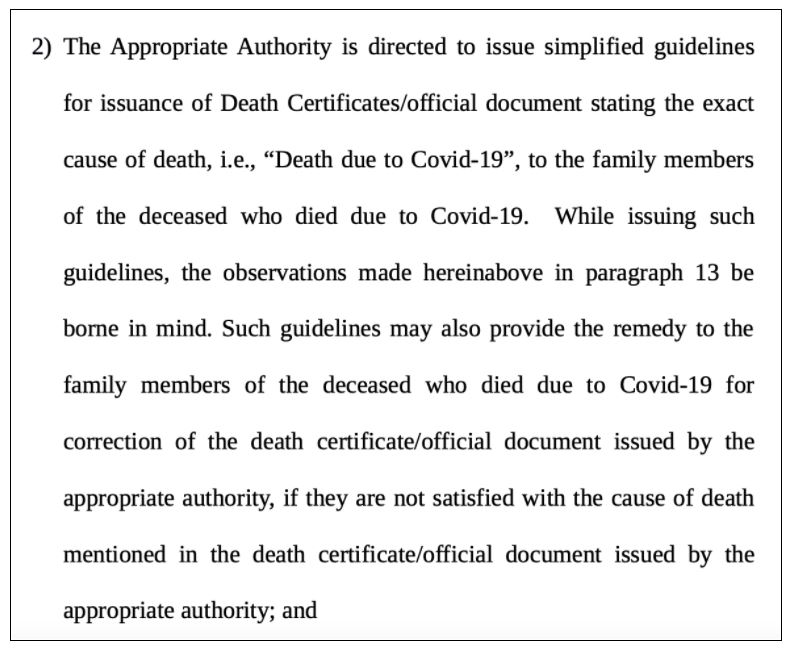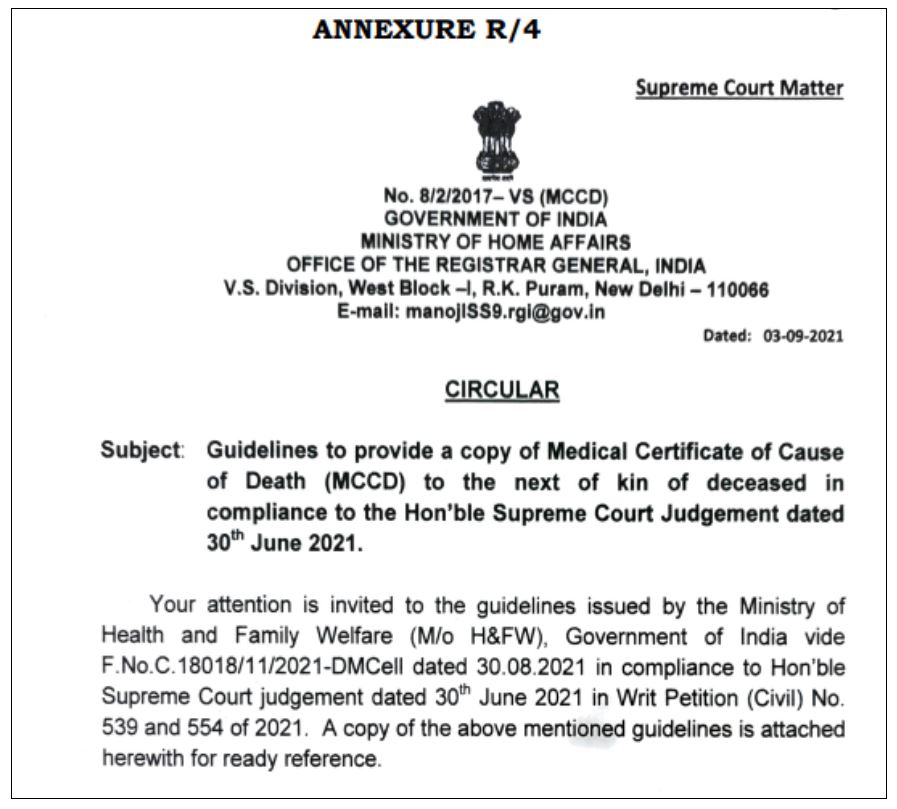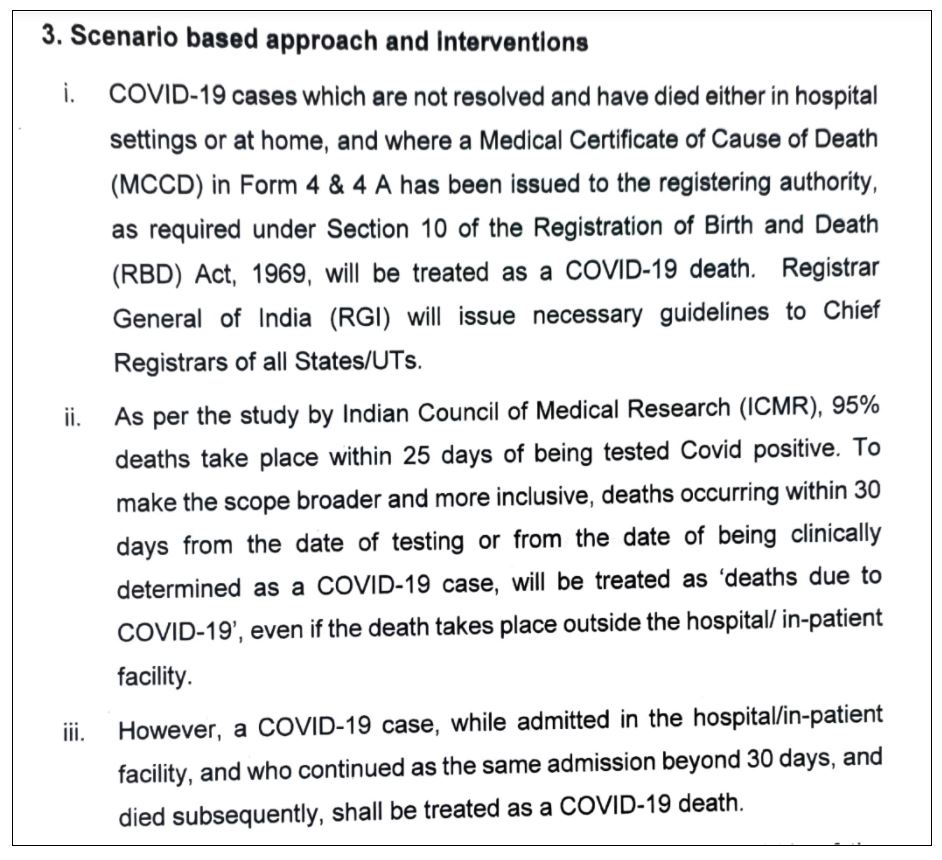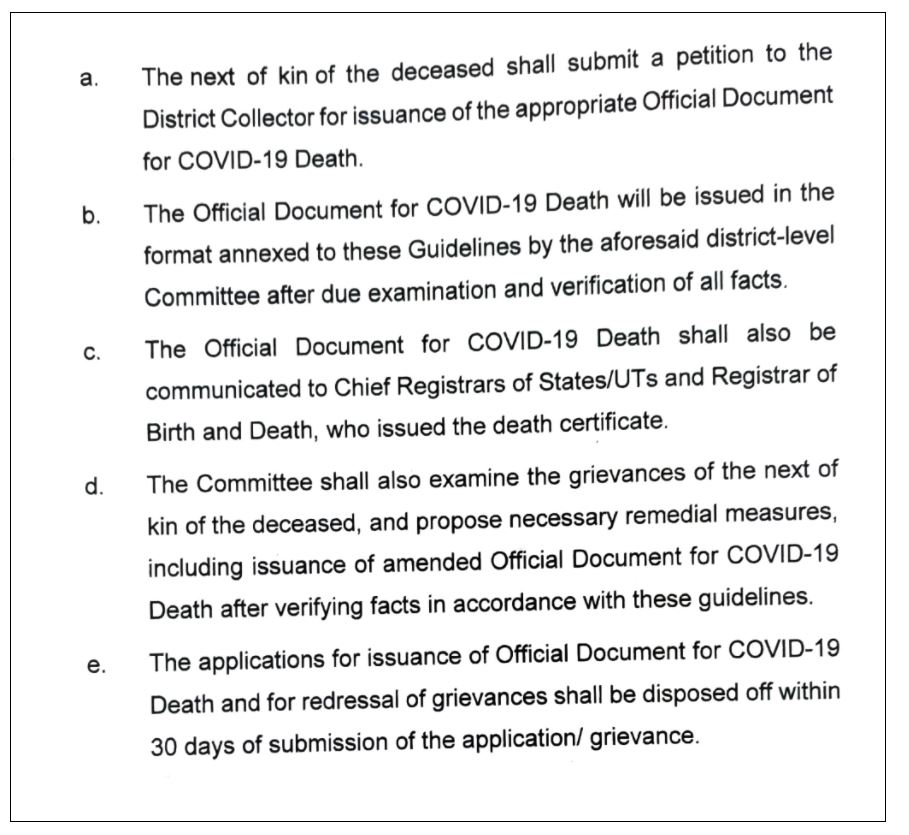In response to a petition filed in the Supreme Court, the government recently framed guidelines for issuance of death certificates for COVID-19 deaths. The guidelines specify which cases are eligible to be considered for the issue of death certificate with cause as COVID-19. Here is a detailed review which also highlights the gaps in these guidelines.
The unprecedented COVID-19 pandemic has claimed the lives of close to 46.4 lakh persons globally in less than two years since it was first reported in China in late 2019. India has recorded the second-highest number of cases of COVID-19 after the USA with over 3.32 crore cases. India has also recorded the third-highest number of COVID-19 deaths with more than 4.43 lakh deaths due to the pandemic, as of 14 September 2021. It is in this context, the Supreme Court recently heard writ petitions seeking compensation of Rs. 4 lakhs for the families of persons who lost their lives because of the pandemic.
A writ petition was filed seeking ex-gratia compensation for families of COVID-19 victims
On 30 June 2021, a special bench comprising of Justices Ashok Bhushan and M R Shah of the Supreme Court heard a plea seeking compensation to the families of persons who lost their lives due to COVID-19 or due to the post-COVID-19 complications. The petitioners cited Section 12 of the Disaster Management Act (DMA), 2005 that has a provision of minimum standards of relief to be provided to the persons affected by the disaster. The bench held that the National Disaster Management Authority (NDMA) has a statutory obligation to frame guidelines for recommending minimum ex-gratia assistance for the families of persons who died due to COVID-19 as the pandemic is notified as a disaster. The apex court directed the NDMA to issue guidelines for the ex-gratia compensation within six weeks, which was later extended to ten weeks. The government told the Supreme Court that the guidelines for determining the compensation under Section 12 of the DMA will be finalized by 23 September 2021. It is to be noted that the decision on the quantum of compensation by way of ex-gratia assistance to the family members has been left to the NDMA.
Furthermore, the court also observed in this petition that there was a need for simplified procedure for issuance of a death certificate/official document in the case of a COVID-19 related death. The death certificate is to be issued to the family members of the deceased who died due to COVID-19 stating the cause of death as “Died due to COVID-19”, including if their death must have been due to other complications resulting from COVID-19. The Supreme Court further added that the guidelines should also provide for a grievance redressal mechanism for the families of the deceased if the correct/exact cause of death is not mentioned in the death certificate.

MoHFW & ICMR have issued guidelines for the issuance of death certificates
Following the SC’s orders, on 11 September 2021, the Central Government finally filed a compliance affidavit. As per this affidavit, the Union Ministry for Health and Family Welfare along with the Indian Council for Medical Research (ICMR) have issued relevant guidelines for the issuance of death certificates for COVID-19 deaths.
According to the guidelines, COVID-19 cases are those which are diagnosed through active infections tests such as RT-PCR tests, molecular tests, rapid-antigen tests or clinically determined through investigations at a hospital or in-patient facility by a treating physician, while admitted in the hospital/ in-patient facility.
Deaths outside hospitals within 30 days from the day of testing will be treated as COVID-19 deaths
In the guidelines, COVID-19 deaths have been defined as cases of COVID-19 which did not get resolved and resulted in deaths at home or hospitals, and where a Medical Certificate of Cause of Death (MCCD) in Form 4 & 4A has been issued to the registering authority, as required under Section 10 of the Registration of Birth and Death (RBD) Act, 1969. Those cases where the death takes place outside the hospital/in-patient facility within 30 days from the date of testing or from the date of being clinically determined as a COVID-19 case, will be treated as a death due to COVID-19. The 30 days bracket has been arrived at based on an ICMR study which found that 95% of the deaths take place within 25 days of being tested positive. Further, a COVID-19 case admitted in hospitals and continued as the same admission beyond the 30 days, and eventually succumbed to the virus will also be considered a COVID-19 death.
However, deaths that occur due to poisoning, suicide, homicide, accidents, etc. will not be treated as COVID-19 deaths even if the virus infection is an accompanying condition.
Committee for grievance redressal will be set up
The procedure for grievance redressal has also been listed in the guidelines. States/UTs must set up a committee comprising government officials, medical experts, and a subject expert for issuing the COVID-19 death certificate. If the MCCD is not available or if the deceased’s family is not satisfied with the cause of death mentioned in the death certificate, they can submit a petition to the District Collector for issuing the appropriate official document for COVID-19 death. Applications for issuing the official document and for redressal of grievances should be disposed of within 30 days of submission.
SC has asked the Centre to consider suicide of infected person as COVID-19 death
Upon considering the Central government’s guidelines, the Supreme Court asked the Centre to reconsider its decision to not treat death by suicide of a person infected with COVID-19 as deaths occurring due to the virus infection. Furthermore, the Court raised a few more queries including the manner of implementation of the policy by states, the timeline for constitution of grievances redressal committee, documents to be submitted by families to the committee, and documents to be provided by concerned hospitals. The government is expected to respond on these issues by 23 September 2021, the next date of hearing.
Definition of COVID-19 deaths does not include all, leaving out many from compensation
Through these guidelines, the government has defined what constitutes a COVID-19 case and the circumstances under which the cause of death in the death certificate will be considered as COVID-19. If the compensation scheme is rolled out using the definitions in these guidelines, the eligibility for compensation will in all probability be linked to a valid death certificate with cause as COVID-19. However, not all COVID-19 deaths are taken into consideration for issuance of the death certificate with this cause as per the current guidelines.
Firstly, under-reporting of COVID-19 cases and COVID-19 deaths is a huge concern. There are claims of under-reporting of deaths from multiple sections of the media and by various organizations. According to a study conducted by researchers from India, Canada, and the USA, India’s actual death rate due to COVID-19 could be about 7 to 8 times higher than the officially reported number. The preprint study which is not yet peer-reviewed is based on India’s civil registration system (CRS) data and extrapolated excess mortality in the country between the months of June 2020 and July 2021.
Secondly, the guidelines mandate positive COVID-19 test results or clinical determination by a physician while being admitted to a hospital to be considered a COVID-19 case. Only such valid COVID-19 cases will be eligible for a death certificate with the cause as COVID-19. However, not everyone would have gotten themselves tested due to unwillingness, fear, or even lack of awareness. Also, during the initial months of the outbreak, only symptomatic individuals could avail the test provided they were a healthcare worker, or contacted a positive case, or had history of international travel. So, symptomatic & asymptomatic individuals those who did not qualify the criteria could not get themselves tested even if they were infected with the virus. There could also be cases where individuals may have got negative results because of errors in testing but were actually infected. During the early stages of the outbreak in India, testing & treatment facilities were limited which meant that people in the rural areas could not have got themselves tested even if they wanted to. Many such cases which resulted in death outside medical facilities would not qualify as a death due to COVID-19 as per the current guidelines, meaning they might miss out on any compensation scheme that would be rolled out in the future. It is time the government thinks about such cases and comes up with revised guidelines to include such cases.
Malaysia has announced compensation for victims of COVID-19
In July 2021, the Disaster Management Authority of Malaysia, NADMA, announced that it will be providing one-off cash assistance of RM 5,000 to one heir of any Malaysian citizen who dies from COVID-19. This is approximately Rs. 89,700. The compensation is given to only those COVID-19 related deaths confirmed by the Health Ministry. Also, only Malaysian citizens are eligible and only one heir can avail the compensation. Reports indicate that NADMA prioritizes applications from the children seeking special assistance.
Compensation to families of those deceased because of COVID-19 would be of considerable support especially if the deceased was the sole breadwinner of the house. Moreover, any such compensation scheme may help in assessing the actual death toll due to COVID-19. While the guidelines for the compensation scheme by the Government of India are awaited, the government would do well to prioritize the most vulnerable- women and children.
Featured Image: Guidelines for issuance of death certificates for COVID-19 deaths.





